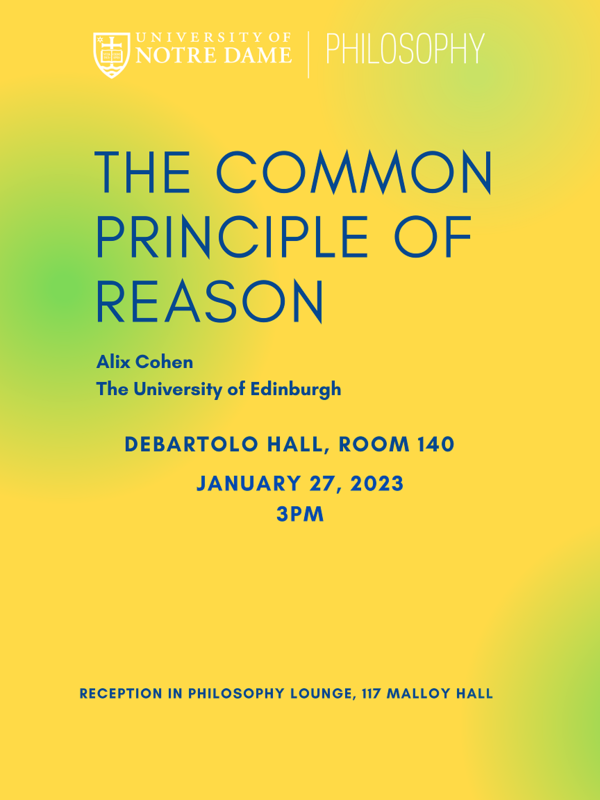Guest Speaker Professor Alix Cohen ( University of Edinburgh)

Guest Speaker Professor Alix Cohen from the University of Edinburgh will be here on Friday, January 27, at 3:00pm in DeBartolo Hall, room 140.
Talk Title: The Common Principle of Reason
Abstract: In the Groundwork, Kant makes a cryptic reference to ‘the unity of practical with speculative reason in a common principle [gemeinschaftlichen Princip]’ (G, 4:391). It appears in a context where he spells out what is required of a critique of a pure practical reason. It must include, Kant writes, the presentation of ‘the unity of practical with speculative reason in a common principle, since there can, in the end, be only one and the same reason, which must be distinguished merely in its application’ (G, 4:391). Right after making this claim, Kant notes that this presentation can’t take place at this point in the Groundwork for fear of ‘confusing the reader’ with ‘considerations of a wholly different kind’ (G, 4:391) – presumably a lot of difficult material from the Critique of Pure Reason. Kant may well have hoped to present it later on, but it is striking that nowhere in his corpus does he do so. In fact, not only does he never discuss the unity of practical with speculative reason in a common principle, he never spells out the common principle of reason, nor does he defend the claim that there is such a principle. My aim in this paper is to make sense of this absence. I will do so by defending the following claim: that there is a single principle of reason that is common to all its uses is an assumption; that is to say, it is a claim Kant makes but never defends. My claim is motivated by the conviction that we shouldn’t underestimate the fact that the common principle of reason is not just elusive, it is in effect missing from the Kantian corpus. While Kant may well have intended to return to it, I believe that the fact that he never does should be taken seriously. In this respect, the interpretation I will put forward in this chapter will attempt to account for what seems like a gap in the Kantian system. But it will also attempt to fill this gap by offering a reconstruction of what Kant could have said to defend the assumption that there is a common principle of reason. To this effect, I will argue that Kant’s account of reason commits him to the following claim: we don’t know the common principle of reason but we must assume that there is such a principle as the necessary condition of reason.